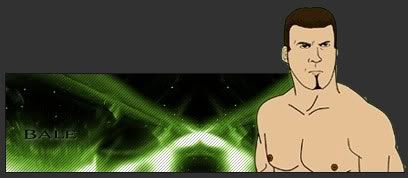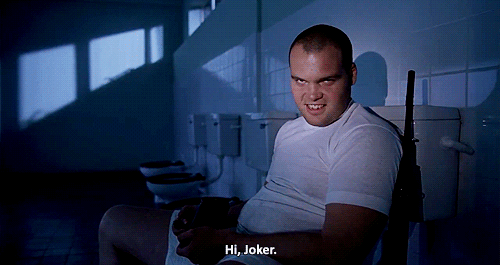 by VaderBomb » Oct 22, '14, 9:02 pm
by VaderBomb » Oct 22, '14, 9:02 pm
Rocky (1976)
Directed by John G. Avildsen
"Yeah. I been out there walkin' around, thinkin'. I mean, who am I kiddin'? I ain't even in the guy's league."
Along with heart, the major theme which personifies Rocky is the will to carry on. It doesn't matter if you're loving or if you're fighting, the battle is always uphill.
There is one moment in Rocky that never fails to move me to tears. After the championship bout, amidst Balboa's iconic calls for his woman... quietly in the background the outcome is announced and the champion raises his arms with fatigue and relief. It's one of the most poetic moments in all of American cinema.
Night of the Living Dead (1968)
Directed by George A. Romero
"It has been established that persons who have recently died have been returning to life and committing acts of murder. A widespread investigation of funeral homes, morgues, and hospitals has concluded that the unburied dead have been returning to life and seeking human victims. It's hard for us here to be reporting this to you, but it does seem to be a fact."
For me, in the beginning of the film, George A. Romero's Night of the Living Dead has always seemed as if it would play out like an old western thriller where bandits surround the town and there seems to be no way out. With a lot of those old westerns, help eventually arrives and good prevails.
The major differences being that in this film there is no way out and as opposed to bandits, these living dead people literally have no souls. Good cannot prevail in this stark universe, and those who should progress will ultimately meet their demise.
Night of the Living Dead is horror cinema at it's most cynical and downright terrifying.
The Searchers (1956)
Directed by John Ford
"Injun will chase a thing till he thinks he's chased it enough. Then he quits. Same way when he runs. Seems like he never learns there's such a thing as a critter that'll just keep comin' on. So we'll find 'em in the end, I promise you. We'll find 'em. Just as sure as the turnin' of the earth."
The Searchers is one of the all time greatest westerns ever made and also one of the best examples of the flawed protagonist. John Wayne as an actor was only better in Howard Hawks' Rio Bravo, but his character of Ethan Edwards is certainly the most interesting of his long and storied career.
But this film is about much more than Wayne. The sheer depth of John Ford's masterpiece is staggering. The tiny details which on paper may seem minute are as profound and awe-inspiring as the vast landscapes and colorful scenes which Ford shot.
The Searchers is pure magic on film and with every re-visit I can experience in all it's visual splendor what the movies are all about.
東京物語 [Tokyo Story] (1953)
Directed by Yasujiro Ozu
"Isn't life disappointing?"
Using his mostly still camera with the perfection of the highest of geniuses, the masterful Yasujiro Ozu's Tokyo Story is one of the most beloved and revered films of all time for good reason. It's a quiet, beautiful little film with a big universal message.
As we grow older, we distance ourselves from our loved ones. We get carried away in our own lives and fail to attempt to pay close attention to the emotions of our elders. We mustn't only respect our family, we must make a great attempt to put ourself in their shoes and realize that loneliness can be apparent in even the wisest of souls.
Don't take anyone in your family for granted, because there is truly nothing more important. The grandparents are the foundation of any family. Tokyo Story demonstrates this with ease and tells a small story capable of the largest impact.
The Thing (1982)
Directed by John Carpenter
"I know I'm human. And if you were all these things, then you'd just attack me right now, so some of you are still human. This thing doesn't want to show itself, it wants to hide inside an imitation. It'll fight if it has to, but it's vulnerable out in the open. If it takes us over, then it has no more enemies, nobody left to kill it. And then it's won."
Often mistakenly called a remake of Howard Hawks' and Christian Nyby's The Thing From Another World, John Carpenter's The Thing is like the former, an adaptation of John W. Campbell, Jr.'s 1938 novella Who Goes There?. Although he takes much inspiration from the old master Hawks, even loosely remaking Rio Bravo as his own Assault on Precinct 13; Carpenter's The Thing is the superior cinematic version of the story.
There are many factors that make The Thing one of the absolute ultimate horror pictures. Carpenter takes the "no way out" scenario of Night of the Living Dead and brings it to an even more extreme situation. There is no outside help in the slightest for these men. They are in Antarctica, frozen in time with an unstoppable, monstrous presence.
Alongside the pitch-perfect suspense which is driven by the exceptional direction and performances, Ennio Morricone's score only adds to the greatness within. Rob Bottin and Stan Winston's special creature effects are as timeless as anything produced in that field of art, and it all holds up to this day one hundred percent. This film is full of violent, bloody gore and mayhem.
With no female characters, The Thing is an inherently masculine feature. What we learn is that apparent toughness will only get you so far. There are far tougher things in this universe than man. Their paranoia and bravado could potentially be contributing forces to do them in. Although it doesn't quite matter much, the monster is virtually indomitable.
Un condamné à mort s'est échappé ou Le vent souffle où il veut [A Man Escaped or: The Wind Bloweth Where It Listeth] (1956)
Directed by Robert Bresson
"It's time to be quiet now."
Robert Bresson's A Man Escaped is as pure and visceral as cinema can get. This is a simple and very spiritual tale about the longing for freedom that a single man experiences attempting to escape what he sees as certain death and the lengths that he will go to escape this apparent certainty.
This is a world where nothing is cinematically exaggerated and everything is laid out on the table face up. A Man Escaped is the truest type of movie that exists.
Spoorloos [The Vanishing] (1988)
Directed by George Sluizer
"My daughter was bursting with pride. But I thought that her admiration wasn't worth anything unless I could prove myself absolutely incapable of doing anything evil. And as black cannot exist without white, I logically conceived the most horrible deed that I could envision right at that moment. But I want you to know, for me killing is not the worst thing."
A man loses his life partner. She is taken away from him by an unknown source. With unrelenting hope, the man obsessively searches for anything that will help him to get her back. What he finds is something more terrifying than he thought he could possibly imagine.
The Vanishing is an easy film to relate to and quite the immersive viewing experience. It's as thrilling as the best thrillers and as horrific as the best horror films, yet it's more of a mystery. A unique type of mystery in the sense that after the main action takes place, it's not so mysterious for the viewers, but more so for the protagonist Rex Hofman. Repeated viewings make it even more interesting where one comes to realize all of the little eccentricities of the film and how they progress the happenings and world-view of the characters.
The Vanishing is a film about hope, but in the end all is hopeless?
Ace in the Hole (1951)
Directed by Billy Wilder
"I can handle big news and little news. And if there's no news, I'll go out and bite a dog."
Billy Wilder's darkly brilliant followup to Sunset Boulevard is a scathing attack of the media and how they take full advantage of bad situations and people during dire circumstances.
A man is stuck dying in a hole and the only man who he believes that he can trust has nothing on his mind but personal benefits, money and glory. Ace in the Hole is one of Wilder's absolute best films made at the peak of his powers. Wilder was never so critical, and until The Apartment almost a decade later, he was never better.
The Holy Mountain (1973)
Directed by Alejandro Jodorowsky
"The grave recieves you with love. Surrender yourself to the Earth. Return what was loaned to you. Give up your pleasure, your pain, your friends, your lovers, your life, your past, what you desire. You will know nothingness, it is the only reality. Don't be afraid, it's so easy to give. You're not alone, you have a grave. It was your first mother. The grave is the door to your rebirth. Now you will surrender the faithful animal you once called your body. Don't try to keep it, remember, it was a loan. Surrended your legs, your sex, your hair, your brain, your all. You no longer want to possess, possession is the ultimate pain. The earth covers your body, she came to cover you with love, because she is your true flesh. Now you are an open heart, open to receive your true essence your ultimate perfection. Your new body, which is the universe, the work of god. You will be born again, you will be real. you will be your own father, your own mother, your own child, your own perfection. Open your eyes, you are the earth, you are the green, you are the blue, you are the Aleph, you are the essence. Look at the flower, look at the flower, for the first time look at the flowers."
The Holy Mountain is a surreal trip into the psychedelic and colorful world of Alejandro Jodorowsky and is the best film that he ever made. El Topo comes close, but this film pushes the barrier even further into human consciousness and all that we experience on earth and possibly beyond.
Despite these claims of surrealism and tripped out colors, this is a serious artistic statement which transcends most descriptive terms. This is not a fun film by the loose definition of the word. It's a demanding trip that bitch slaps you right as you fully understand his message, but it's damn enjoyable the whole journey. To be immortal means you are exceeding the human condition; the alchemist is the most interesting breed of cinematic teacher.
The Wild Bunch (1969)
Directed by Sam Peckinpah
"We all dream of being a child again, even the worst of us. Perhaps the worst most of all."
Another apt title for The Wild Bunch would have been No Country for Old Men. The wild west has changed and not to the benefit of the cowboys of the previous generations. The west is a metaphor for the world, and The Wild Bunch has much to say about this place.
Beautifully shot in color and soaked with blood, there has never been a finer or more profound film in the entire genre of Western. Sam Peckinpah's violent The Wild Bunch breaks down all barriers and tells it's story with flair and panache.
Rope (1948)
Directed by Alfred Hitchcock
"I've always wished for more artistic talent. Well, murder can be an art, too. The power to kill can be just as satisfying as the power to create."
Rope is Hitchcock's most tense thriller and also his best. Easily the most underrated picture in all of his great filmography, everyone involved is at the top of their game here. John Dall and Farley Granger are especially good, and Jimmy Stewart has one of the most memorable speeches in all of cinema.
This film is full of artistic shots and philosophical depth, not to mention that Hitchcock is really having fun with this one. That's as far as the fun goes, though. The claustrophobia of Rope exceeds that of Rear Window and it's tautness goes beyond Psycho or Vertigo.
Can murder be art? Rope addresses this question with confidence and much creativity.
西鶴一代女 [The Life of Oharu] (1952)
Directed by Kenji Mizoguchi
"What has led to your ruin?"
Kenji Mizoguchi is the most sympathetic director considering females, and The Life of Oharu is his most sympathetic film. He avoids all melodramatic devices and tells a very sad story without audience hand-holding or overly sentimental scenes.
The end result is a stunning portrait or a poor woman who deserved a better life. The Life of Oharu is one of the best and most tragic Japanese films by Japan's greatest filmmaker.
Nostalghia [Nostalgia] (1983)
Directed by Andrei Tarkovsky
"Where am I when I'm not in reality or in my imagination? Here's my new pact to the world: it must be sunny at night and snowy at August. Great things end, small things endure. Society must become united again instead of so disjointed. Just look at nature and you'll see that life is simple. We must go back to where we were to the point where you took the wrong turn. We must go back to the main foundations of life without dirtying the water. What kind of world is this if a madman tells you must be ashamed of yourselves? Music now!"
Andrei Tarkovsky's soul-searching and atmospheric masterpiece is a beautiful and elemental film unlike any other. While in exile from his homeland, he crafted an exquisite allegorical tale with many open ends. It's extremely personal, even more so than his Mirror. Whereas Mirror is a film about Tarkovsky's childhood and life, it's also completely universal. I have never been a child growing up in Russia but I can relate to almost everything.
Nostalghia on the other hand is universal in it's philosophy but it's entirely based on Tarkovsky's life experience at the time. It's almost as if Tarkovsky is giving a big "fuck you" to everyone while embracing what he had to create for the sake of art.
Nostalghia is a masterpiece with an absolute trance-like quality. It's slow but never boring and always beautiful. Only Tarkovsky could have a film of the quality of Nostalghia and it not be in their five best films.
Fitzcarraldo (1982)
Directed by Werner Herzog
"This church remains closed until this town has its opera house. I want the opera house."
Only the biggest dreamers could dream of accomplishing such a feat: to pull a giant riverboat from river to river over the peak of a jungle covered mountain.
Werner Herzog is certainly one of the biggest dreamers in cinema. He's a man without fear, a man with a vision. And this film is one of his ultimate masterpieces.
Beautifully shot, hypnotic and even slightly psychedelic at times, Fitzcarraldo plays out like a great piece of classical literature. It's almost as if after Francis Ford Coppola attempted to top Herzog's own Aguirre: The Wrath of God, Herzog used this film as a chance to top Apocalypse Now. Herzog accomplishes what Coppola could not.
Few films from the 80s or from all times are as visionary and impressive in sound design at the same time. The way that Herzog shoots the natives is so unique. It feels almost as if one was there among these people attempting the impossible.
Fitzcarraldo is Herzog's second best film after Aguirre, and it's his magnum opus in a way. Never again would he attempt something so ridiculous and epic. With Klaus Kinski at his side... or his throat, depending; the great filmmaker and the great actor mirror each other in countless ways. Herzog's creation of this film is just as grand as the feat accomplished within the film, and that makes it all the more respectably mind-blowing.
Blowup (1966)
Directed by Michelangelo Antonioni
"Someone's been killed. I want you to see the corpse."
Brilliantly paced like most of Antonioni's best features, Blowup is a slow-brooding yet extremely vibrant, entertaining film about the power of vision and the mystery that is manifested when (and if) our eyes play tricks on our brains. Would you involve yourself in a potentially sinister situation when you have apparently nothing to gain? Especially if you aren't even sure of what you see?
More than in any of his other films, Michelangelo Antonioni embraces the counter-culture and uses it to it's fullest extent. This movie is a time capsule of the "Swinging London" of the 60s, and I couldn't enjoy it more as a reflection of it's time.
Eyes Wide Shut (1999)
Directed by Stanley Kubrick
"Bill, do you have any idea how much trouble you got yourself into last night just by going over there? Who do you think those people were? Those were not just some ordinary people. If I told you their names... no, I'm not going to tell you their names... but if I did, I don't think you'd sleep so well at night."
Kubrick's final masterpiece is a grandiose vision of the complex mysteries of the world. People assume that they know everything that's going on, but there are secrets that are quite deep and when exposed could potentially bring doom to those who access those secrets.
Like all of Kubrick's best works, it's visually stunning and really takes a toll on the psyche. Kubrick's film demands that the viewer must attempt to come to the realization of how they would react if put in the position that Bill Harford has gotten himself into.
Eyes Wide Shut is an extremely sensual psychological drama. Sex and intelligence have been in battle for centuries, but here they are woven seamlessly into the same tale.
A Woman Under the Influence (1974)
Directed by John Cassavetes
"Mabel is not crazy, she's unusual. She's not crazy, so don't say she's crazy."
Home to the most genuine performances to have ever graced the screen, John Cassevete's ultimate masterpiece is the most powerful statement on madness alongside Fritz Lang's M.
This type of madness is different though, and opposed to bringing death this madness brings love and nurture. Can this be defined as insane? A Woman Under the Influence attempts to answer these questions a best as it can, and the results are absolutely absorbing.
Kanał [Canal] (1957)
Directed by Andrzej Wajda
"It's easier to die when you're in love."
Even better than the more highly praised Ashes and Diamonds, Kanał is not only Andrzej Wajda's best, it's the greatest Polish film ever made.
The descent of these characters into the sewers of Warsaw during the final days of the Uprising is strenuous to say the least. This place is full of filth and grime and its a literal hell for all who enter.
Shot in breathtaking black and white, Kanał is one of the most powerful political statements to ever grace the silver screen.
Восхождение [The Ascent] (1977)
Directed by Larisa Shepitko
"Then go, go on living - without a conscience. It can be done."
The Ascent is an allegorical masterpiece and one of the most beautifully shot black and white films that I've ever seen. The way director Larisa Shepitko presents these men juxtaposed against the white snow is extremely memorable.
Never had a simple cough changed the lives of the two protagonists as much as it did in this film. But the moral lesson here isn't to pack throat lozenges. The message here is much heavier, and it's sheer honesty makes The Ascent undeniably important.
4 luni, 3 săptămâni şi 2 zile [4 Months, 3 Weeks and 2 Days] (2007)
Directed by Cristian Mungiu
"We're never going to talk about this, ok?”
Would a vehemently traumatic experience negatively affect the strongest bond that two humans in this world could have? How far would you go for someone that you care for, even if the situation alienates you more than you could possibly imagine?
4 Months, 3 Weeks and 2 Days addresses these questions with more subtlety and ambiguity than mere answers. This bleak and distressing dramatic thriller puts a pressure on the viewer's nerves that is as strong as the mental pressure to undergo an illegal abortion; and unlike Gabriela's baby in her own mind, there is nothing disposable about this cinematic masterpiece.
La grande illusion [Grand Illusion] (1937)
Directed by Jean Renoir
"Frontiers are an invention of men. Nature doesn't give a hoot."
Aside from Charles Chaplin, Jean Renoir was the only director of the 30s who had the balls and the heart to create a film as touching and poignant as this. La grande illusion is pro-human, but also quite critical of us at the same time; especially in hindsight. Along with the characters, their relationships and the excellent story, a good deal of this film's integrity lies within it's title.
Here, men treat outsiders with kindness and respect in the most dire of situations, yet part of the illusion is that it's all without merit. Only a fraction of the world seemed to have learned from these people. If men could have so much heart while at war... why can't we act the same way when in a busy checkout line around the holidays? Or while sitting in traffic and late to work on a hot summer day?
Not to mention the absolute hostility, discrimination and hatred which occurs not only in modern wars but everywhere around us. There are many illusions in this world; the grand illusion is assuming that we are radically different from one another when in fact we are all one in the same.
All generations from the "baby boomers" onward could learn much from this most important and cherished film.
La belle et la bête [Beauty and the Beast] (1946)
Directed by Jean Cocteau & Rene Clement
"Children believe what we tell them. They have complete faith in us. They believe that a rose plucked from a garden can plunge a family into conflict. They believe that the hands of a human beast will smoke when he slays a victim, and that this will cause the beast shame when a young maiden takes up residence in his home. They believe a thousand other simple things. I ask of you a little of this childlike simplicity, and, to bring us luck, let me speak four truly magic words, childhood's open sesame: "Once upon a time..."
Irreproachable, invigorating magic from Jean Cocteau and René Clément; this version is the best film retelling of this traditional fairy tale.
Beauty and The Beast just might be the most spellbinding movie ever made. The set decor is unparalleled. The shot of Belle flowing down a corridor of the Beast's lair is one of the most enchanting scenes ever filmed. This is a movie with many riches for adults and children alike, and the most worthy aspect is the magic itself. They sure don't make them like this anymore.
A true, flawless masterpiece for the whole family to enjoy? Cocteau's Beauty and The Beast is the only one in existence.
Der siebente Kontinent [The Seventh Continent] (1989)
Directed by Michael Haneke
"Do you feel alone sometimes? Do you love dad and me?"
"The whispers in the morning of lovers sleeping tight
Are rolling by like thunder now as I look in your eyes
I hold on to your body and feel each move you make
Your voice is warm and tender
A love that I could not forsake
'Cause I am your lady and you are my man
Whenever you reach for me, I'll do all that I can
Lost is how I'm feeling, lying in your arms
When the world out side's too much to take
That all ends when I'm with you
Even though there may be times
It seems I'm far away
But never wonder where I am
'Cause I am always by your side
'Cause I am your lady and you are my man
Whenever you reach for me, I'll do all that I can
We're heading for something
Somewhere I've never been, sometimes I am frightened
But I'm ready to learn about the power of love"
Love has no power in this absolutely hopeless psychological drama. The mundane takes over and all that is left is disastrous. Chantal Akerman's Jeanne Dielman is channeled, but even Akerman wouldn't go this far into the depraved psyche of this godforsaken family.
Perhaps a big change and some good old culture shock would have done them some good? Although after seeing this film draw it's conclusion, it's tough to imagine that anything good could come from these people.
砂の女 [Woman in the Dunes] (1964)
Directed by Hiroshi Teshigahara
"Do you shovel to survive, or survive to shovel?"
We as humans are prisoners to the system, and never has that truth been made so painfully and surrealistically clear than in Hiroshi Teshigahara's ultimate masterpiece. Sometimes there seems to be no escape from this existential prison, but if we can allow ourselves to be happy and attempt to better the situation, it doesn't seem so hopelessly depressing.
In order to fully appreciate this beautiful and absurd piece of cinema, one must let go of all logic and become one with the overall feel. Woman in the Dunes is a sensual and highly visual allegory and like most great works of cinema, it's difficult to capture it's magic in words.
We're all particles of sand. Seemingly pointless, but we as particles make up the desert that is our world, and what would your world be without your existence? Someone else's? Or depending on the way that you look at it, perhaps nothing.
The Texas Chain Saw Massacre (1974)
Directed by Tobe Hooper
"Things happen here about, they don't tell about. I see things. You see, they say that it's just an old man talking. You laugh at an old man, it's them that laughs and knows better."
The Texas Chain Saw Massacre is the most terrifying movie of all time. It's both a flawless representation of it's time and an unrelenting journey into a world that shouldn't exist at all but most certainly does somewhere in the world. That place in reality may not be in Texas but The Texas Chain Saw Massacre is convincing in the world that it creates.
Brown grass, rusty engines, chicken bones and human bones are scattered throughout. Never has America been painted in such a sinister and intense light. The Texas Chain Saw Massacre is Tobe Hooper's best film by a country mile, and if these happenings did take place than I'd hope to be at least five hundred country miles away from it.
Nattvardsgästerna [Winter Light] (1963)
Directed by Ingmar Bergman
"God, why have you created me so eternally dissatisfied? So frightened, so bitter? Why must I realize how wretched I am? Why must I suffer so hellishly for my insignificance? If there is a purpose to my suffering, then tell me, so I can bear my pain without complaint. I'm strong. You made me so very strong in both body and soul, but you never give me a task worthy of my strength. Give my life meaning, and I'll be your obedient slave."
Winter Light is one of those extremely rare examples where every single millisecond of film used is exactly what the artist intended it to be. This is the shortest, sweetest, straight to the point parable of Bergman's career. I don't see how anybody could be a fan of this filmmaker and not absolutely love this film.
Winter Light reminds me of the winter months. Bleak, cold and sleepy, Bergman's masterpiece on the subject of faith is a sleeper that will someday be recognized as a better film than The Seventh Seal and Wild Strawberries.
Journal d'un curé de campagne [Diary of a Country Priest] (1951)
Directed by Robert Bresson
"All is grace."
Everyone is a critic in Ambricourt. Before Robert Bresson's Diary of a Country Priest, the French countryside had never seemed so full of degeneracy.
The young priest is too concerned with attempting to help these degenerates battle their own corruption that he doesn't take the time to take a step back and take care of himself. It's not like anybody else in Ambricourt will take that duty, and that lack of self care could lead to his eventual demise. Taxi Driver owes direct influence to this film.
God may not be a torturer, but the citizens of this young priest's Ambricourt sure are.
The Last Picture Show (1971)
Directed by Peter Bogdanovich
"Don't you wish y'all had made it?"
Nothing to do.
A common phrase uttered by the younger generations all around the world, and this movie exemplifies that notion but is also much wiser.
The Last Picture Show is my favorite coming of age tale, it tells the simple story of a dying town and it's youth but also maintains a profound statement on life and death. Technically, it's just as inspired as Citizen Kane and Orson Welles' influence is apparent, but Welles never attempted to travel this deep down the arteries into the hearts of the kids of America.
And their hearts were full of spring.
Les quatre cents coups [The 400 Blows] (1959)
Directed by Francois Truffaut
"Oh, I lie now and then, I suppose. Sometimes I'd tell them the truth and they still wouldn't believe me, so I prefer to lie."
John Lennon once wrote a song entitled "Woman Is the Nigger of the World". Here Truffaut seems to argue that the young boy could be just as chastised. Antoine Doinel can't seem to do anything right, he seems like a smart little guy with decent intentions, especially for his age. But he just can't win.
The smaller you are, the harder you have to fight. Doinel attempts to fight, but the system holds his head inches away as his fists swing into dead air. The 400 Blows is the most expressive and passionate expression of the psychological state of being a troubled child. The last shot is eternal; a freeze frame giving a firm look into the soul of a youth in trouble. And it's all so true, iconically frozen.
From time to time, especially during the "interrogation" scenes I relate this beautiful masterpiece to the Paradise Lost films.
M (1931)
Directed by Fritz Lang
"I'm pursued by ghosts. Ghosts of mothers and of those children... they never leave me. They are always there... always, always, always!, except when I do it, when I... Then I can't remember anything."
M is the ultimate personification of madness on the screen. Here exists a criminal so brutally depraved that all of the other criminals band together to end his madness. The heat is getting too close for comfort and this results in an all out man-hunt.
The brilliant Fritz Lang was never better, and his tale of child murder and the philosophical retributions is a timeless testament to both upper echelon German cinema and the world of horror and deceit.
M is an exquisitely crafted crime thriller, and an influence to countless works of art.
The sights. The sounds.
It's perfection of the highest order.
Le trou [The Hole] (1960)
Directed by Jacques Becker
"I've never met men like you before."
While not as famous as some of his contemporaries, Jacques Becker had a handful of truly incredible films under his belt before his last. Touchez pas au grisbi and Casque d'Or are his more superior works, but nothing even comes close to his final film. The greatest prison escape film of them all.
Le trou is alongside The Wages of Fear and The Thing, one of the all time great masculine thrillers. Like the major characters in those two drastically different films, these men will stop at nothing to continue their painstaking efforts to free themselves from a living hell. Whether they make or it or not is up to you the viewer to find out.
Le trou is masterfully rugged example of freedom as it's most worthy, and perfection from the assistant director of Renoir's La grand illusion.
Days of Heaven (1978)
Directed by Terrence Malick
"Nobody's perfect. There was never a perfect person around. You just have half-angel and half-devil in you."
Terrence Malick's greatest achievement is the most visually opulent film of the 70s alongside Fellini's Amarcord, Erice's Spirit of the Beehive and Tarkovsky's Solaris, Mirror and Stalker. Malick wasted no time getting the most mind-blowing footage that he could.
A midwestern miracle created at the most magical of hours, Days of Heaven is the most beautifully naturally lit, historically based film ever shot by quite a large margin. Malick was never more pure than he was here and out of all his films Days of Heaven is the most cinematic. Considering Malick's output, that is quite the statement. So is this film.
On a visual and poetic level, Days of Heaven is as good as cinema gets.
La règle du jeu [The Rules of the Game] (1939)
Directed by Jean Renoir
"I have no choice but to dismiss you. It breaks my heart, but I can't expose my guests to your firearms. It may be wrong of them, but they value their lives."
As wonderful and poetic as Grand Illusion is, Renoir topped it only once and this here is his best work. A plethora of characters exist in this story. Not unlike within a Robert Altman film, from a more recent time when cinema has been largely more realized. These characters have severe flaws and Renoir embraces those flaws fully. Everyone has a personal relationship with one another and the tale is told so seamlessly that it comes across like a great work of literature.
But The Rules of the Game is no book, it's a movie. A very critical one at that. Perhaps the most critically brilliant film ever made. Directly preceding the onset of World War II, the upper class celebrate themselves and each other. And why not? It sure beats the fear. Right?
Right?
War is like the rabbit hunt. Excessive and pointless. The Rules of the Game is anything but.
L' armée des ombres [Army of Shadows] (1969)
Directed by Jean-Pierre Melville
"She said five minutes, but she'll wait a lifetime"
Jean-Pierre Melville's best film Army of Shadows is an extraordinarily deep and thrilling portrait of a group of French Resistance fighters trying to survive and thrive in Nazi-occupied France. Like the Melville's own Le samurai and Le cercle rouge, it's exquisitely shot with gloomy, natural lighting and aesthetically it's quite ahead of it's time. Also, like those aforementioned films, the suspense herein packs a wallop.
Army of Shadows is a masterful film about hope in the darkest of times within the darkest of shadows, yet that hope is ultimately futile. Everyone in this dramatic thriller are hopelessly doomed.
切腹 [Harakiri] (1962)
Directed by Masaki Kobayashi
"When my master's house fell we immediately left the domain and moved to Edo. The streets of Edo were crowded with ronin - flotsam from the Battle of Sekigahara. In former times, other clans would have gladly taken in any ronin who'd earned a name for himself. But in an era no longer in need of warriors or horses, so peaceful that no wind even rustled the leaves on the trees, it was a constant struggle simply to find a meal. Indeed, it shames me to recall our miserable lives of these last eight or nine years."
Just how far will honor and loyalty take you in this world? Honor and loyalty for tradition, for family, for life? Often going hand in hand, these philosophies can also collide. Sometimes with the bloodiest results.
Masaki Kobayashi's Harakiri is the ultimate samurai tale. The story is told with elegance and the film is a visual feast for the eyes. Never has a samurai battle been so meticulously choreographed and never has a samurai film been so critical of the samurai code.
Harakiri takes much inspiration from the craft of Kurosawa, but Kobayashi expands upon that inspiration with no lack of depth and creates a vision and politically epic story that transcends any work from the former.
The best Japanese film of the 60s is a giant claim, and Harakiri meets that claim with both "balls to the wall" bravado and intellectual insight.
A torinói ló [The Turin Horse] (2011)
Directed by Béla Tarr
"Theirs is the moment... nature, infinite silence."
Béla Tarr's final film, a tortuous apocalyptic nightmare is also his most pure film experience. The Turin Horse takes no prisoners while painting it's bleak picture.
The last time that we saw something this powerful in the cinema was nearly six years prior with Apichatpong Weerasethakul's Syndromes and a Century. Both films have a lot to say about the human condition, and while they couldn't be more different, they are companion pieces in a way.
Human existence will be joyful only if we allow it to be. We mustn't let the mundane control our lives. The people who live in the world of The Turin Horse have no choice, but we the viewers do.
Nashville (1975)
Directed by Robert Altman
"Y'all take it easy now. This isn't Dallas, it's Nashville! They can't do this to us here in Nashville! Let's show them what we're made of. Come on everybody, sing! Somebody, sing!"
Robert Altman is a brilliant filmmaker. One of the best, and I always knew he had this in him. M*A*S*H* is a great film. The Long Goodbye, 3 Women and especially McCabe and Mrs. Miller are all incredible, even masterful films; but Nashville...
Nashville is an absolutely perfect piece of cinema.
There's nothing more than I can say without ruining the movie other than the ending had me legit bawling my eyes out. While I was experiencing the final stretch, I didn't even know that it was the end, and through my tears I couldn't imagine that any other scene in this film could be as powerful and beautiful. I was correct in my assumption. When the credits hit, I was spellbound. There are few scenes in any movie that are as emotionally poignant.
แสงศตวรรษ [Syndromes and a Century] (2006)
Directed by Apichatpong Weerasethakul
"I'd like to be a normal person. But a mysterious force has a hold on me."
Nature and human connection are the true existential foundations of our lives. Like the infamous intake vent; bad things will suck the life out of us unless we maintain those foundations. Syndromes and a Century is the most beautiful and profound drama of the 00s.
Aguirre, der Zorn Gottes [Aguirre: The Wrath of God] (1972)
Directed by Werner Herzog
"I am the great traitor. There must be no other. Anyone who even thinks about deserting this mission will be cut up into 198 pieces. Those pieces will be stamped on until what is left can be used only to paint walls. Whoever takes one grain of corn or one drop of water... more than his ration, will be locked up for 155 years. If I, Aguirre, want the birds to drop dead from the trees... then the birds will drop dead from the trees. I am the wrath of god. The earth I pass will see me and tremble. But whoever follows me and the river, will win untold riches. But whoever deserts..."
Aguirre: The Wrath of God is a haunting visionary adventure that was as much of an adventure to create as what we see on the screen. Director Werner Herzog and the volatile Klaus Kinski's brilliant portrayal of Don Lope de Aguirre mirror each other and reflect their own hearts of darkness. A reflection that would be repeated, albeit differently with Herzog's later Fitzcarraldo. Herzog was a filmmaker with a unique and powerful vision and he never compromised his art for the sake of convenience. I'm not so sure if Herzog even knows the definition of the word.
Along with a hundred Incan slaves, Aguirre continuously and mercilessly pushes his band of conquistadores further into the abyss of the Amazon in search of El Dorado. The landscape is untouched by man except for the natives, who react quite naturally to these new invaders from Europe. The soul of the jungle is uncompromising and the voyage slowly but surely envelopes these adventurers into a brutal, blood-soaked nightmare. Less based on historical accuracy than most historical dramas, this imaginative parable is a truly savage expedition into the unknown.
The major question that we're left with after the credits roll is, "Did they endure?", as Aguirre infamously declared that they would. After taking this inimitable cinematic journey I believe that we all know the answer to that.
La dolce vita (1960)
Directed by Federico Fellini
"Don't be like me. Salvation doesn't lie within four walls. I'm too serious to be a dilettante and too much a dabbler to be a professional. Even the most miserable life is better than a sheltered existence in an organized society where everything is calculated and perfected."
The brilliant Italian filmmaker Federico Fellini was at the absolute top of his game when he made La dolce vita. This essential satirical drama is among the most consistently entertaining and philosophically deep epics of all times.
With La dolce vita, Fellini still embodied but began to distance himself from realism to traverse into the world of dreams and fantastical personal memories. He would soon move on to masterpieces such as 8 1/2 and Amarcord, but before those films never was he more consistent in realms of reality and the dream world all at once.
La dolce vita is as sweet and utterly palatable as the movies get and more than almost any other film, it defines the time when anything in cinema seemed possible.
雨月物語 [Ugetsu] (1953)
Directed by Kenji Mizoguchi
"Tales of the moon and rain."
Unfolding like an ancient scroll, Japanese master filmmaker Kenji Mizoguchi's Ugetsu is a drama that is so full of ghostly mystery with a shimmering dreamlike quality that it's hard to imagine anybody else in the vast genre of Jidaigeki touching it, let alone surpassing it. When I say "hard to imagine" I actually mean "impossible to see" because to this day, the only man who has is the old master himself.
Within the genre of the Japanese period piece, the great Akira Kurosawa has made many great classics, but his art never achieved the magical manifestation and unique language of Mizoguchi's Ugetsu and Sansho The Bailiff. Seeing as Kurosawa was a true impassioned lover of cinema, I always wondered if he'd admit that himself.
In Ugetsu, life and death don't battle; they hold hands. By the time the final scene unravels and the scroll is rolled back up, rarely has death seemed so spiritual and powerful in cinema.
Viskningar och rop [Cries and Whispers] (1972)
Directed by Ingmar Bergman
"Come over here Maria. Look at yourself in the mirror. You are beautiful... but you have changed. These days you cast rapid, calculating, sidelong glances. You're gaze used to be direct, open, and without any disguise. Your mouth is an expression of discontent and hunger. It used only to be soft. Your complexion has become pallid, you use make-up. Your fine, broad forehead now has four creases above each eyebrow... And this fine contour from the ear to the chin... it's no longer quite so evident. That's where complacency and indolence reside... Look here, at the bridge of the nose, why do you sneer so often, Maria?... Beneath your eyes, those sharp, barely visible wrinkles of boredom and impatience."
Ingmar Bergman's masterful Cries and Whispers is an ugly, horrendous film filled with ugly, horrendous characters. They are not physically ugly, but their personalities are so disgusting that by the time this film ends, they truly begin to look hideous despite not changing in appearance.
The film is not visually ugly either. The mansion where ninety-five percent of the movie takes place is a work of art in itself. It's absolutely breathtaking. Never has the color red been expressed unswervingly with so much visual depth and meaning. As a director, Bergman had always excelled in black and white. With the hellacious birth of Cries and Whispers, this was no longer the case. Long time Bergman collaborator Sven Nykvist's cinematography for this one-of-a-kind work of art was unparalleled at the time of this film's release. He would only eventually equal it with Tarkovsky's Offret and Bergman's ultimate work, the five-hour long Fanny and Alexander a decade later.
There is only one character in this film who is not as vile as the rest, but it's just as emotionally draining to follow this character as it is with the others because of the character's relationship with both the abnormal and the paranormal. The few short scenes that take place outside of the mansion where these characters reside is the only escape that we get from this brutal, claustrophobic world of agony and mental torture. As viewers, we can leave this place when the film is over. Cries and Whispers stays with you in the boldest possible sense, but there is an escape regardless. But do these characters ever truly escape?
Au hasard Balthazar [Balthazar] (1966)
Directed by Robert Bresson
"Besides, he's a saint."
Au hazard Balthazar is a film that is as pure as film can get and a high contender for the greatest movie of all. It says more about the beauty and cruelness of this world than virtually any other work of art of it's time and beyond. From a man of many masterpieces, this film is most definitely Robert Bresson's best which is saying quite a lot.
This piece is an anti-sentimental and highly spiritual work of beautiful emotional brilliance that only comes across as the opposite if viewed with a flawed state of mind. Perfect cinema.
Иди и смотри [Come and See] (1985)
Directed by Elem Klimov
"This is war, and nobody is to blame…”
"And when he had opened the fourth seal, I heard the voice of the fourth beast say, Come and see! And I looked, and behold a pale horse: and his name that sat on him was Death, and Hell followed with him. And power was given unto them over the fourth part of the earth, to kill with sword, and with hunger, and with death, and with the beasts of the earth." - Chapter 6 of The Apocalypse of John
The most shocking and brutally realistic anti-war film is also the most beautifully shot. Filmed in glorious color, the dense Belarusian forests, foggy meadows and grimy swamps have been burned into my mind as a place that was seemingly so pure; only to be ravaged by absolute vulgarity and obscene violence. This here is a motion picture that is so powerful that it would have worked even without the picturesque natural settings. Though if it weren't, the overall experience wouldn't have had as much of an impact on the human psyche. Tranquility can only last for so long.
Many things have been said about Elem Klimov's final film Come and See. A harrowing masterpiece. A disturbing fever dream. A violent and overwhelming experience that makes even Apocalypse Now seem tame. All of these things are true, but nothing is truer than what we see on the screen.
During one of the discussions following a screening of the film, an elderly German stood up and said: "I was a soldier of the Wehrmacht; moreover, an officer of the Wehrmacht. I traveled through all of Poland and Belarus, finally reaching Ukraine. I will testify: everything that is told in this film is the truth. And the most frightening and shameful thing for me is that this film will be seen by my children and grandchildren."
I can assure you that there is absolutely nothing that I could state about Come and See which would hold as much ground as that.
La passion de Jeanne d'Arc [The Passion of Joan of Arc] (1928)
Directed by Carl Theodor Dreyer
"Will I be with You tonight in Paradise?"
The most rousing and powerful statement in all of silent cinema has managed to completely transcend being dated in the slightest, if anything it accomplishes something that still hasn't been equaled in the movies. The art of the human face to tell an entire story.
Carl Theodor Dreyer's The Passion of Joan of Arc is visually unparalleled. The performances, especially that of Falconetti's is among the best ever filmed. Dryer took a dramatic turn in style with his later films, but never was he more intense and constant than he was here.
The Passion of Joan of Arc should be viewed either silently or with the Voices of Light soundtrack, either way it's as robust and graceful as could be imagined.
El espíritu de la colmena [The Spirit of the Beehive] (1973)
Directed by Victor Erice
"I told you he was a spirit. If you're his friend, you can talk to him whenever you want. Just close your eyes and call him."
Victor Erice's slow-brooding masterpiece is a very simple, yet highly immersive tale of fear and the impact that fear can have on a child. He takes his time with his scenes, yet the film hardly breaks the 90 minute mark.
The pace and overall presentation give The Spirit of the Beehive a haunting quality that is almost surreal at times. Never has such a simple and quietly woven tale felt so epic, so universal. Erice directs his material with the confidence of Andrei Tarkovsky or Terrence Malick, and the result is just as beautiful.
People fear what they don't understand, and The Spirit of the Beehive is a perfect example of that. It is also a perfect film. Ignorance is bliss, but it can also make nightmares come true.
Андрей Рублёв [Andrei Rublev] (1966)
Directed by Andrei Tarkovsky
"Come with me. You will cast bells, and I will paint”
The most epic and strenuously perfected film ever created, Andrei Rublev stands head and shoulders above all of it's peers. This film goes beyond the descriptive term of Historical Drama or Period Epic. It's both a purely spiritual and violent visual/aural exodus into 15th century Russia and the greatest statement on art and religion in the history of cinema.
Every major character in Tarkovsky's unrelenting masterpiece has as much depth and meaning as most great films maintain as whole. No other film equates itself as the definition of life and human existence more than Andrei Rublev. Words simply don't do it justice.
It's no wonder why a work of art this powerful and critical was banned in the Soviet Union, but it sure is a shame. This movie could have changed the world if released across the globe in 1966. The great Russian was always fighting an uphill battle when creating his art, in this case he might as have well been trekking up Mount Everest.
Isn't that the story of the painter Rublev, though? The artist's struggle? Tarkovsky's own life always seems to mirror his characters. The man seems to be a prophetic as an artist could get. Surely he wasn't aware of the future issues that he'd face. Or was he?
Andrei Rublev is so stunning and exquisite, that it's frightening. Frighteningly magnificent.
Sátántangó [Satan's Tango] (1994)
Directed by Béla Tarr
"Not that human life was so highly valued. Keeping order appears to be the business of the authorities, but in fact it's the business of all. Order. Freedom, however, has nothing human. It's something divine, something... our lives are too short for us to know properly. If you're looking for a link, think of Pericles, order and freedom are linked by passion. We have to believe in both, we suffer from both. Both from order and freedom. But human life is meaningful, rich, beautiful and filthy. It links everything. It mistreats freedom only... wasting it, as if it was junk. People don't like freedom, they are afraid of it. The strange thing is there is nothing to fear about freedom... order, on the other hand, can often be frightening."
Satantango is a giant in the world of cinema. No other film has a reputation that is as daunting as that of Béla Tarr's ultimate work of art.
Throughout it's seven-plus hours, Satantango moves with grace in the rhythm of a tango, hence the title. Six moves forward, then six moves back. It is a devastating film, but a throughly entertaining one despite it's methodical pace and bleak subject matter. There are many messages in Satantango, but no answers. Everything is hopeless.
Tarr's masterful direction is impeccable like always. The cinematography is in a field of it's own. The opening shot is one of the most impressive shots in all of cinema. Don't fret, the rest of the film certainly lives up to the massive expectations after that first shot is over.
Satantango is cinema's ultimate journey and one of the most rewarding visual experiences that exist. I'll revisit this film often with open arms.
Солярис [Solaris] (1972)
Directed by Andrei Tarkovsky
"Science? Nonsense! In this situation mediocrity and genius are equally useless! I must tell you that we really have no desire to conquer any cosmos. We want to extend the Earth up to its borders. We don't know what to do with other worlds. We don't need other worlds. We need a mirror. We struggle to make contact, but we'll never achieve it. We are in a ridiculous predicament of man pursuing a goal that he fears and that he really does not need. Man needs man!"
Watching Tarkovsky's hypnotizing masterpiece is always an extremely enjoyable experience. It's one of the most calming and frightening films all at once, which is a rare combination to take in. Cinematographically, it's a natural progression from Andrei Rublev with a meditative style that is strangely tranquil and ominously brooding. It's all cinematically transcendental.
Solaris is the ultimate science-fiction tale. Nothing within the genre is as profound and truthful. Solaris dips inward into our deepest psyche. We alienate ourselves through technology, when in fact we should focus on nature and human love. The planet Solaris is a mirror, which works toward's Tarkovsky's next picture in the most un-pretentious manner.
The ending of this overwhelming film is one of the most perfect in all of cinema. The soundtrack is untouchable. The overall mood is out of this world. Solaris is the ultimate voyage into our inner selves.
Last edited by
VaderBomb on Oct 22, '14, 9:21 pm, edited 1 time in total.
 Here we go:
Here we go: 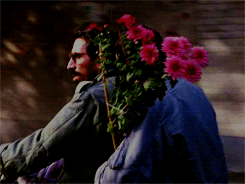


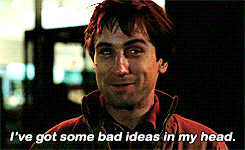
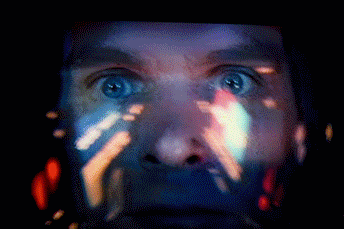
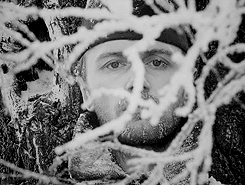
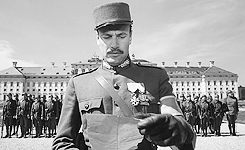
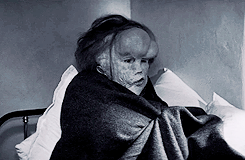

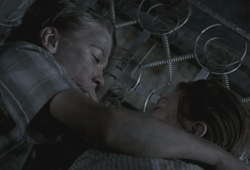

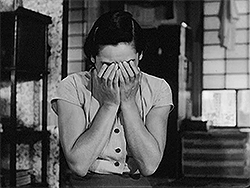
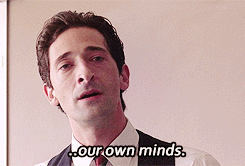










 GOTF is easily one of the most powerful, haunting, eerie, and generally emotionally-charged films I've seen. Rarely do films leave a lasting impression on me, but this was certainly one. Certainly up there with Schindler's List as one of the greatest WW2 films ever made.
GOTF is easily one of the most powerful, haunting, eerie, and generally emotionally-charged films I've seen. Rarely do films leave a lasting impression on me, but this was certainly one. Certainly up there with Schindler's List as one of the greatest WW2 films ever made.
